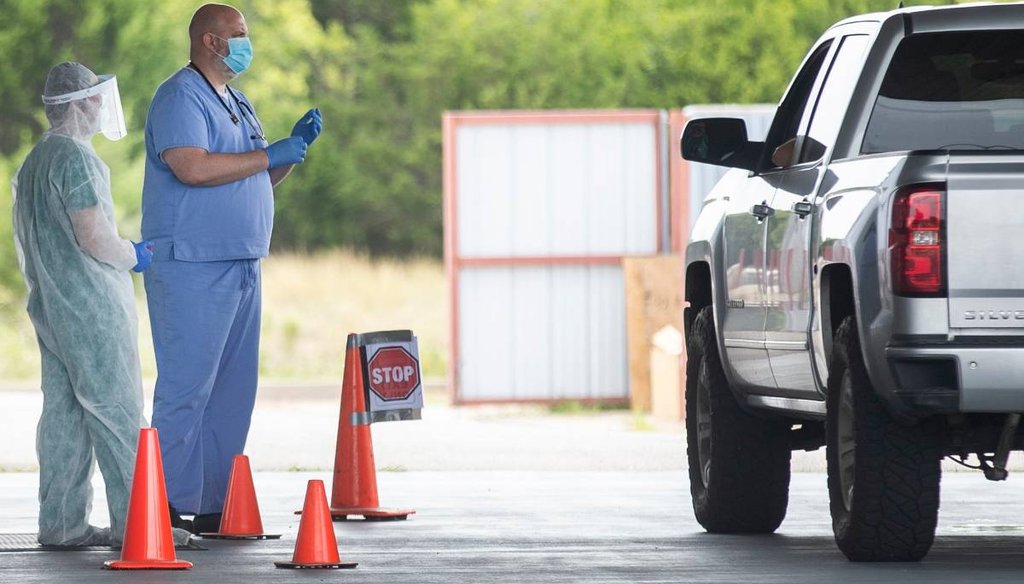Stand up for the facts!
Our only agenda is to publish the truth so you can be an informed participant in democracy.
We need your help.
I would like to contribute

Health workers prepare to administer a COVID-19 test at a drive-through testing area in Central Texas (Ricardo Brazziell/Austin American-Statesman).
If Your Time is short
- The Texas Department of State Health Services removed 3,484 coronavirus cases from its total count for the state.
- A viral tweet describing the decision said the cases were not confirmed tests, but that does not tell the whole story.
- The removed tests were positive antigen tests, fast-acting tests with a high rate of false negatives.
As the number of new cases and deaths from the coronavirus continue to surge in Texas, a widely circulated tweet about statewide data went viral Thursday, even leading U.S. Sen. Ted Cruz to share the post.
The tweet, shared by Fox 4 anchor Steve Eagar had garnered more than 25,000 retweets and 30,000 likes by Friday afternoon, and claims that the Texas Department of State Health Services removed more than 3,000 COVID-19 cases from its statewide coronavirus database because San Antonio was reporting probable cases for people who had never been tested for the disease.
"The State of Texas today had to remove 3,484 cases from its Covid-19 positive case count, because the San Antonio Health Department was reporting ‘probable’ cases for people never actually tested, as ‘confirmed’ positive cases.- TDHS," the tweet read. "What other departments make this same mistake?"
Cruz, a Republican from Texas, responded to the tweet and called the news "troubling." His tweet received nearly 10,000 retweets and more than 25,000 likes by Friday afternoon.
But the viral tweet doesn’t tell the whole story. While the state health agency did, in fact, remove some cases from San Antonio from its statewide database, the cases in question were not people who had never been tested.
Sign up for PolitiFact texts
We dug into the numbers to find out exactly what happened here.
What’s an antigen test?
The 3,484 cases at issue here were not the result of the molecular coronavirus tests, which typically requires a long swab to collect a tissue sample from the nose and throat.
Instead, these cases were all positive antigen tests, according to the Texas Department of State Health Services and San Antonio Metro Health.
Antigen tests are FDA-approved rapid detection tests for the coronavirus that can detect the virus and provide results within minutes of administration. They are not the same as antibody tests, which are used to determine whether an individual was previously infected with the coronavirus.
Currently, Texas reports on all antibody testing and molecular coronavirus tests, but does not include results from antigen tests in its totals.
Part of the problem? The antigen tests may not detect all active infections like the molecular COVID-19 test, according to the FDA. That means a negative antigen test may need to be confirmed with an additional molecular test.
"Antigen tests are very specific for the virus, but are not as sensitive as molecular PCR tests," a May memo from the U.S. Food and Drug Administration read. "This means that positive results from antigen tests are highly accurate, but there is a higher chance of false negatives, so negative results do not rule out infection."
Antigen tests are considered presumptive cases by the federal Centers for Disease Control, which the agency includes in its national COVID-19 case count.
Why is the state removing San Antonio’s antigen data?
San Antonio Metro Health said it would continue to track positive antigen testing in its own reporting but would separate "confirmed" COVID-19 cases from the "probable" antigen cases at the request of the state.
Metro Health Director Dr. Colleen Bridger said the distinction between antigen and viral cases is a "disagreement over what should be reported in total counts."
"Probable cases do not mean ‘maybe’ cases of COVID-19," Bridger said in a statement. "Antigen tests are FDA approved, and positive tests are highly accurate. San Antonio is one of only three Texas cities collecting and reporting this data per the CDC guidelines, but the state of Texas wants apples-to-apples comparisons between Texas cities."
But the Texas Department of State Health Services sees the "probable" case definition as reason to exclude antigen results from statewide data.
"The case data on our website reflect confirmed cases, and cases identified by antigen testing are considered probable cases under the national case definition," a spokesman for the health agency said in an email Thursday, adding that the agency is ensuring that other local jurisdictions are reporting uniformly.
A spokesman for the Texas Department of State Health Services said the agency is considering ways to include antigen testing in its reporting.
Our Sources
Tweet, Ted Cruz, July 17, 2020
Tweet, Steve Eagar, July 15, 2020
San Antonio Metro Health, San Antonio Metro Health separates "confirmed" COVID-19 cases from "probable" cases at the request of the state, July 16, 2020
Food and Drug Administration, FDA Authorizes First Antigen Test to Help in the Rapid Detection of the Virus that Causes COVID-19 in Patients, May 9, 2020
Centers for Disease Control and Prevention, Coronavirus Disease 2019 (COVID-19) 2020 Interim Case Definition, April 5, 2020
Centers for Disease Control and Prevention, FAQ: COVID-19 Data and Surveillance, accessed July 17, 2020
Email interview with Austin Public Health spokesperson, July 17, 2020
Email interview with Chris Van Deusen, spokesman for the Texas Department of State Health Services, July 16 and July 17, 2020























































